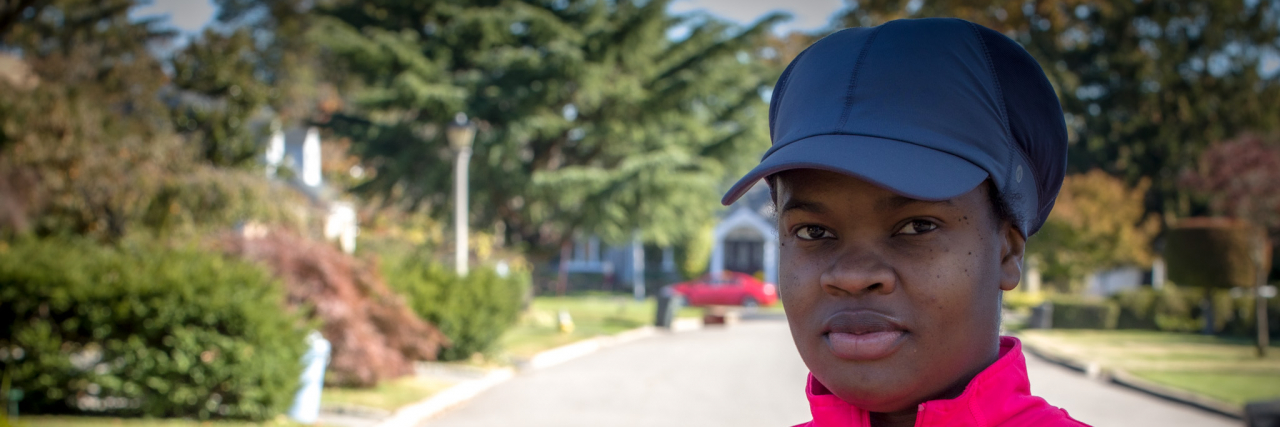The word “control” comes to mind when I think of running — controlling your breath, your pace, your mental willpower to keep going, even when the road seems impossible. That concept of control – seeking it and keeping it — is also a perfect way to describe my life with lupus.
Because of lupus, in 2020, I lost control of my passion, my ability to lace up my running shoes and just go. Thanks to my great doctors, support system, and medical research, I was able to regain control of the condition and get back to what I love doing.
Let me back up.
I was always “healthy.” I took to running and even worked on completing several half marathons. I made sure to “eat right,” and take care of myself both mentally and physically.
However, in 2018, I was 32, and after the birth of my second child, everything changed. I was tired, all of the time (and more than a “give-me-a-double-shot-of-espresso-and-I’ll-be-OK” kind of tired. My joints ached and I was losing patches of my hair. I was diagnosed with systemic lupus erythematosus (SLE) in Oct 2018, an autoimmune disease described as an over-active immune system that can cause inflammation affecting different parts of the body (such as my joints, hair, etc.).
Quickly after getting diagnosed, I was put on an oral medication, which helped ease my lupus symptoms. In December 2018, I was even able to go and complete the Honolulu marathon in Hawaii.
I have to say; I am one of the lucky ones. On average, it can take a person up to six years to get diagnosed. Imagine taking that long – that delays your treatment! By taking control of my health early, I was diagnosed early and got on a path of recovery early. I even felt well enough to continue running and I ran the New York City Marathon in 2019, a huge accomplishment.
Things started to take a turn in 2020. Of course, the pandemic didn’t help anyone’s physical or mental state. I gave birth to my third child in May 2020, and 6 weeks postpartum, I felt terrible. I was worse than ever before. What I thought was just a flare-up post-birth turned into my new painful normal.
I experienced hair loss, fatigue, and severe joint pain. I had trouble walking, and had to hang up my running shoes. At that point, walking was extremely painful. My energy level was next to none. Besides the physical pain, mentally I felt a cloud of sadness hanging over me. I was very despondent at times. Waking up each day with pent-up anxiety and worrying about how much more my health could deteriorate compounded my physical pain. The mental anguish of lupus can be just as overwhelming as its physical manifestations.
I felt like my health was reeling out of control, and I knew I needed, once again, to take the helm. I thought to myself “I am only in my 30s, I have three beautiful children to raise, a supportive family, I have so many plans for my life — this cannot be my life.”
I needed to rise up. I was becoming increasingly frustrated and at my wit’s end after multiple rounds of steroids did not relieve my symptoms. It is at this point that I expressed my deep concerns to my rheumatologist, Dr. Cynthia Aranow at the Feinstein Institutes for Medical Research, who told me about a new clinical trial for a medication already approved for people with my form of lupus. The goal of the trial was to see if taking it early in someone’s diagnosis could sway the disease’s progression altogether. Like a roadblock. I signed up for the two-year trial, and as of October 2021, I am halfway through.
While I don’t know if I got the placebo or the actual medication, what I can tell you is my body is feeling stronger every day, my blood work indicates I am getting better, and though it is a slow process that requires much patience, some areas of my hair are growing back. Most importantly, I am back to running! I have already done some smaller races and have my sights set for 2023 to run again in the NYC marathon. In addition, I have many countries that I intend to run a race.
My message to anyone living with a painful, chronic condition is to take control. Talk openly to your doctors, ask if clinical trials are available, rely on your friends or family or even social media for support; it is all-important. If you work with the right team, you can get back to your everyday life, or some version of it.
As a Physician Assistant, I was used to always being the health care provider and it often feels strange to be the patient. But, I have a better understanding now that tackling any health issue is a two-way street between your care team and you. Be honest with your doctors. No question is a foolish one! Don’t be afraid to speak up and fight for your care.
Of course, I wish I could go back to what life was like before my diagnosis. I often miss my old self and sometimes reminisce on those days. However, I am learning to embrace this “new” me and make sure my disease doesn’t define who I am or take over. This road is unpredictable and extremely difficult at times, but with new innovations in medicine, a good medical team, being intricately involved in my care, family support, faith, and self-care, (including but not limited to a well-balanced diet, rest, and exercise), I believe I can live a full life. I don’t know what the future holds, but I am hopeful that with continued research, the mysteries of lupus will be unearthed and lives can be changed immensely.
Lupus isn’t a sprint; it’s a marathon and I plan to keep running for a long, long time.

